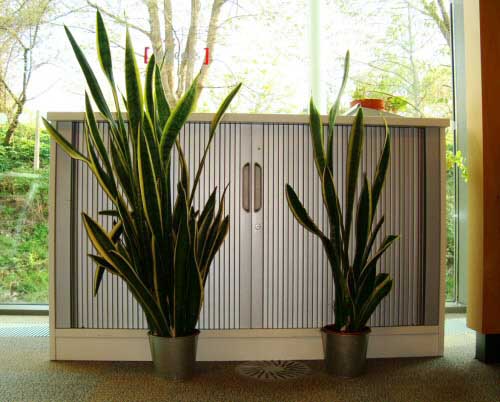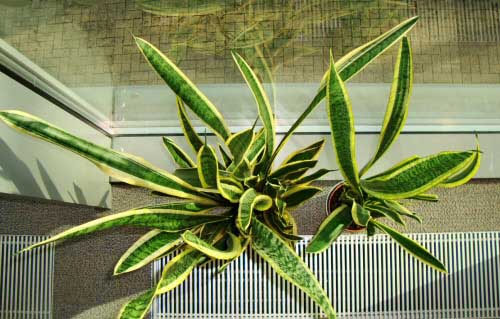By their very nature houseplants want to survive. This might very well be one of the most important things to remember when you are keeping indoor plants. They really do want to live.
It doesn't matter if you think you have a black thumb (or an entire black hand) no plant wants to give up and end up in your compost bin without a fight. Most have truly amazing perseverance and will adapt for a time to harsh conditions, but don't confuse a thriving plant with a surviving one.
Some time ago our department at work all brought a number of plants to green up our desks. Mine was a Sansevieria (Mother-in-law's-tongue), another of my colleagues also got the same. And so it began, two similarly sized young plants in their silver pots settled into a new life in our office.
Whizz by several years and side by side here they are today:

Mine is on the left in both pictures and I would say with reasonable confidence that it's thriving. Where as my colleague's plant is noticeably a lot smaller and arguable in comparison it is only surviving.

Sansevieria is one of the toughest plants you can get, taking quite poor conditions such as little light and a lot of general neglect but this type of treatment is precisely why the plant on the right isn't doing quite as well.
Although they are both still in the same pots they were brought in, the plant on the right is positioned in a shady spot and is rarely watered. Before I took the picture above I even had to blow dust off the leaves, that's some serious plant cruelty right there folks.
My colleague also couldn't tell you when (if ever) she last gave it fertiliser. In fact I asked her about it last week, to which she responded with quite a confused expression, "What? You're supposed to give your plant cow poo then?!".

Hi, I'm Tom!
If you're like me and enjoy the challenge of growing houseplants and getting them to thrive, then Ourhouseplants can help. This website shares my knowledge and years of growing plants and provides (hopefully) helpful advice on properly caring for your indoor plant friends.
However I believe my plant (although never been rubbed over with cow dung) receives the best conditions it can get for an indoor Sansevieria: bright light all day and some sun for a few hours (if it's a sunny day of course), it's watered each week or so and I try to provide liquid fertiliser at half strength every few months.
The pot is of course tiny, but it obviously loves being pot bound, and the result of that speaks for itself.
If you want houseplants to thrive and prosper you need to study their individual needs and do your best to provide what they require
Normally it wouldn't be possible to compare two of the same plants in this way, especially over a period of many years.
But when you can it demonstrates the difference between a plant which is making do with what it has been given, and a plant which has been given everything that it needs.
If you want houseplants to thrive and prosper you need to study their individual needs and do your best to provide what they require. We can help with this. All our articles have extensive care instructions to help you get the most out of your plants and get them thriving in your home.
So spend some time reading through. Your 10 minute investment will pay you dividends in respect of your plants health (and not having to spend your own money replacing it).
Of course there is nothing wrong with the plant that just survives, but if you want that extra little flourish on top you might need to change something that you are currently doing.
Have you any stories like this? Perhaps pictures of your own long term (or even short term) experiments. If so we'd love to read about them in the comments below, even send us a cheeky picture or two if you can.